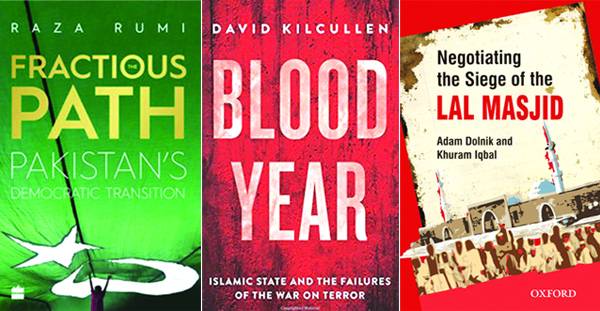
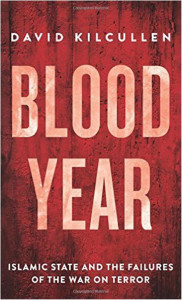
Blood Year: Islamic State and the Failures of the War on Terror
David Kilcullen
Hurst (paperback), 2016
PRs 1757
Blood Year is an unsparingly honest, self-critical analysis of the collapse of western counterterrorism strategy, by one of its original architects. As a soldier, counterterrorism official, and Chief Strategist in the US State Department’s Bureau of Counterterrorism, David Kilcullen was one of the key designers of US and allied counterterrorism policy. His insights helped to shape the strategy, known as ‘Disaggregation’, which crippled Al-Qaeda and prevented a follow-up to the 9/11 attacks. He served in Iraq at the height of the conflict there, and found himself in harm’s way in Southeast Asia, Libya, Somalia, Pakistan and Afghanistan. So Kilcullen’s frank assessment — that the strategy he helped design has failed, that it has not made us safer, and has contributed to new threats, including ISIS — makes this short book mandatory reading for anyone interested in how terrorism is confronted. The most startling part of his analysis is that there may be worse dangers than ISIS incubating in various parts of the world.
Kilcullen’s prescription for change, for a thorough reimagining of the threat, and for an open public debate on how to deal with it, will be a massive challenge. But if western democracies are to avoid more years of blood, it will be essential.
Reviews
‘This is a lucid story, humanely told and utterly chilling, in which the author wears his experience and erudition lightly. It should be read by those who still cling to the debris of the fences they sat on over Iraq and Syria.’ — David Gardner, The Financial Times
‘Such an important book…What makes Blood Year particularly valuable is that Kilcullen manages to recount the events of 2014 and 2015 without succumbing to the pull of political correctness or the push of conventional wisdom. In a world where extreme views garner all the attention, and everyone is an instant expert, it is a genuine pleasure to get a practitioner’s perspective from someone who knows what they are talking about yet still manages to tell it like it is.’ —The Sunday Times
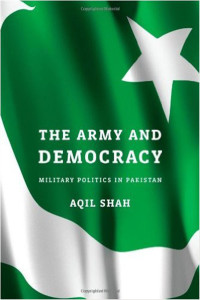
The Army and Democracy
Aqil Shah
Harvard (hardcover), 2014
PRs 1795
Since Pakistan gained independence in 1947, only once has an elected government completed its tenure and peacefully transferred power to another elected government. In sharp contrast to neighboring India, the Muslim nation has been ruled by its military for over three decades. Even when they were not directly in control of the government, the armed forces maintained a firm grip on national politics. How the military became Pakistan’s foremost power elite and what its unchecked authority means for the future of this nuclear-armed nation are among the crucial questions Aqil Shah takes up in The Army and Democracy.
Pakistan’s and India’s armies inherited their organization, training, and doctrines from their British predecessor, along with an ethic that regarded politics as outside the military domain. But Pakistan’s weak national solidarity, exacerbated by a mentality that saw war with India looming around every corner, empowered the military to take national security and ultimately government into its own hands. As the military’s habit of disrupting the natural course of politics gained strength over time, it arrested the development of democratic institutions.
Based on archival materials, internal military documents, and over 100 interviews with politicians, civil servants, and Pakistani officers, including four service chiefs and three heads of the clandestine Inter-Services Intelligence, The Army and Democracy provides insight into the military’s contentious relationship with Pakistan’s civilian government. Shah identifies steps for reforming Pakistan’s armed forces and reducing its interference in politics, and sees lessons for fragile democracies striving to bring the military under civilian control.
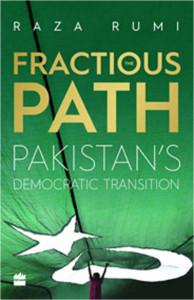
The Fractious Path: Pakistan’s Democratic Transition
Raza Rumi
Harper Collins (paperback), 2016
PRs 995
Since its inception, Pakistan has oscillated between authoritarianism and democratic spells. An anthology of news commentaries, The Fractious Path makes an attempt at tracing Pakistan’s political trajectory during the years 2008-2013. These years mark Pakistan’s transition from General Pervez Musharraf’s authoritarian regime to a democratic order. The books tells us about the powerful civil-military government that ruled the country for almost three decades and it was around this time, 2007 precisely, that Benazir Bhutto was assassinated, the 2008 elections returned her party to power and a hybrid military-democratic government was put in place. The Pakistani Taliban, jihadism, a fragile economy coupled with Afghanistan’s regional conflict deterred the country’s overall growth.
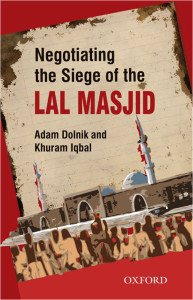
Negotiating the Siege of the Lal Masjid
Adam Dolnik and Khuram Iqbal
Oxford (hardcover), 2016
PRs 1095
In January 2007, the students of Lal Masjid (Red Mosque) took over the Children’s Library in Islamabad in protest against the Government of Pakistan’s decision to demolish mosques and seminaries built illegally on government land. After six months of escalating tensions, the crisis culminated in an eight-day siege and eventually ended by an armed assault resulting in over a hundred casualties and even more injured. This tragic outcome of the standoff had a devastating spillover effect as it turned into a rallying cry for Islamist militancy in the country. Based on extensive field research including interviews with key actors on all sides, this book provides an in-depth analytical account of the events that unfolded during the siege, with specific emphasis on the successes and failures of the negotiation process. It outlines important lessons and practical guidelines for crisis negotiators, incident commanders, and political decision-makers in order to provide them with the necessary tools to manage possible similar crises in the future more effectively.
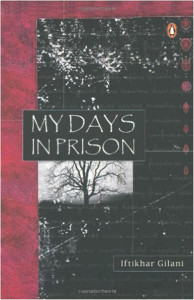
My Days in Prison
Iftikhar Gilani
Penguin (paperback), 2005
PRs 400
This is the story of tragedy and triumph. A grim account of one man’s encounter with the harshest face of the Indian state, with a finale that gives one hope and confidence in the power of the country’s civil society.
On June 9, 2002, Iftikhar Gilani, a Delhi-based Kashmiri journalist, was arrested under the Official Secrets Act. His apparent crime: leaking out information about Indian Army deployments. Gilani spent the next seven months in Tihar jail.
On January 13, 2003, he was released and the case against him withdrawn since there really was no case. This book is Gilani’s story. It is a strong indictment of the way many functionaries of India’s security apparatus abuse power in so-called national interest.
The charge against Gilani was absurd. His computer contained material downloaded from a publication of a Pakistani think tank. This was no secret; the information was in the public domain.
That Gilani was “framed” seemed clear to those who were holding him and the “higher authorities” behind them. Yet for months, he had to suffer the ignominy of being thought of as an enemy agent.
In jail, Gilani suffered humiliation and torture. He was restricted to a high-security ward, beaten until he bled and made to clean filthy toilets with his shirt and then forced to wear the same shirt again.
Gilani’s suffering, however, had a silver lining. It brought together journalists, academics, human-rights activists, lawyers and even some politicians who rallied to have Gilani released. And they finally succeeded.

